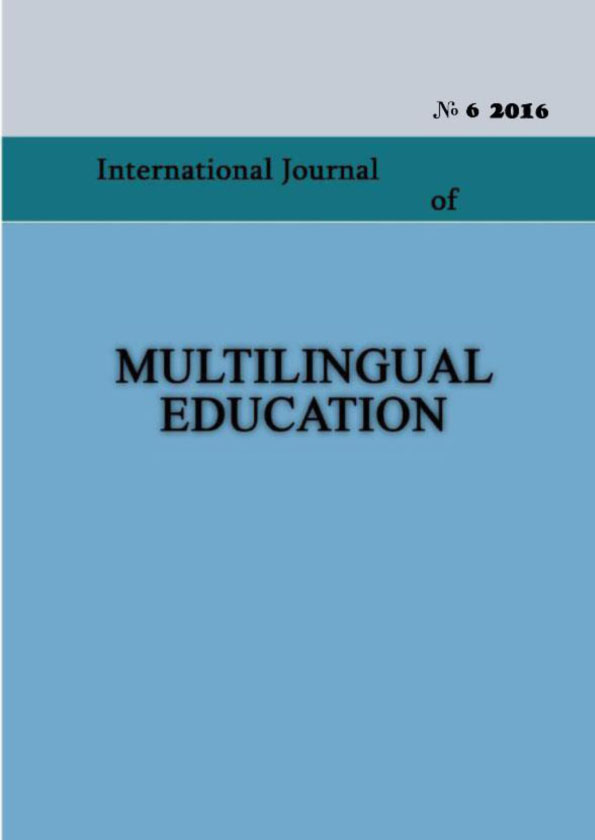Multilingually and multiculturally oriented Master’s curriculum: Oles Honchar Dnipropetrovsk National University experience
Keywords:
multilingualism, multilingual education, curriculum, syllabi, competences, learning outcomes, specialization, cross-cultural communication.Abstract
The present article is aimed at showing Oles Honchar Dnipropetrovsk National University (DNU) experience in developing multilingually and multiculturally oriented Master’s curriculum for the speciality “Language and Literature (English)” with specialization “Multilingual Education”. In the first section of the paper the notion multilingualism has been defined, and the difference between multilingualism and polyglottism has been shown. The article goes on to emphasize the main principles of the Bologna Process in Europe and their peculiarities in the Ukrainian system of higher education. Further the distinguishing features of bilingual and multilingual education have been singled out. The second section – Discussion and Results – is aimed at showing practical implementation of principles of multilingual education in Master’s curriculum. The curriculum uses the Common European Framework of Reference for Languages as a basis for defining competences and learning outcomes for the whole curriculum and for each syllabus in particular. All the competences have been described and modified so as to meet the higher education demands provided by the Ministry of Education and Science of Ukraine and multilingual education requirements as well. The Master’s curriculum of the mentioned speciality consists of five blocks. Each block contains a particular number of ECTS points with account of European higher education demands. Besides, every block includes several disciplines; and after studying them all the necessary learning outcomes and competences are provided. We come to the conclusion that multilingual education is a key to success – as co-learning of languages and linguocultures promote the formation of multilingual polycultural personality that provides a lifelong learning.
References
Abello-Contesse Ch., Chandler P. M. Bilingual and Multilingual Education in the 21st Century: Building on Experience / Ch. Abello-Contesse, P. M. Chandler. – Multilingual Matters. – 352 p.
Council of Europe. Common European Framework of Reference for Languages: Learning, Teaching, Assessment. Cambridge: Cambridge University Press. – 2001.
Dewaele J., Wei L. Multilingualism, Empathy, and Multicompetence / J. Dewaele // International Journal of Multilingualism. - 2012. - P. 1-15.
Education in a Multilingual World. UNESCO Education Position Paper. – 2003. – 39 p.
Guide to the Bologna Process. The UK HE Europe Unit // http://www.unl.pt/data/qualidade/bolonha/guide-to-the-bologna-process.pdf
Hornberger N., Vaish V. Multilingual Language Policy and School Linguistic Practice: Globalization and English-language Teaching in India, Singapore and South Africa / N. Hornberger, V. Vaish // Compare: A Journal of Comparative and International Education.
2008. - P. 1-15.
Hornberger, N. H. Multilingual Education Policy and Practice: Ten Certainties (Grounded in Indigenous Experience) / H. h. Hornberger. – Language Teaching. – 42 (2)
2009. – P. 197-211.
Lewis E. G. Bilingualism and bilingual education: The ancient world to the renaissance /
E. G. Lewis // J. A. Fishman (Ed.), Bilingual education: An international sociological perspective. – Rowley, MA: Newbury House, 1976. – P. 150–200.
Multilingual Europe: Reflections on Language and Identity / Ed. by J.Warren and
H. M. Benbow. – Cambridge, 2008.
Multilingualism in the European Union // http://www.ecose.org/gr8parents_files/multilingualism_in_eu.doc
The Bologna Process 2020 – The European Higher Education Area in the new decade Communiqué of the Conference of European Ministers Responsible for Higher Education, Leuven and Louvain-la-Neuve, 28-29 April 2009 //
http://www.ond.vlaanderen.be/hogeronderwijs/bologna/conference/documents/leuven_lo uvain-la-neuve_communiqu%C3%A9_april_2009.pdf
Wilton A. Multilingualism and foreign language learning / A. Wilton // Handbook of Foreign Languge Communication and Learning, K. Knapp & B. Seidlhofer (eds). – Berlin: Mouton de Gruyter, 2009. – P. 45-78
Published
How to Cite
Issue
Section
License
Copyright (c) 2015 Alla Anisimova, Iryna Popova, Iryna Bezrodnykx

This work is licensed under a Creative Commons Attribution-NonCommercial 4.0 International License.
Copyright (c) - Authors who publish with this journal agree to the following terms: Authors retain copyright and grant the journal the right of first publication with the work simultaneously licensed under a Creative Commons Attribution-Noncommercial 4.0 International License, which allows others to share the work with an acknowledgement of the work's authorship and initial publication in this journal. Authors are permitted and encouraged to post their work online (e.g., in institutional repositories or on their personal website) prior to and during the submission process, as it can lead to productive exchanges, as well as earlier and greater citation of published work (see The Effect of Open Access). Authors may enter into separate, additional contractual arrangements for the non-exclusive distribution of the journal's published version of the work (e.g., post it to a repository or publish it in a book), with an acknowledgement of its initial publication in this journal.

